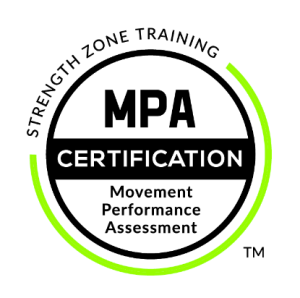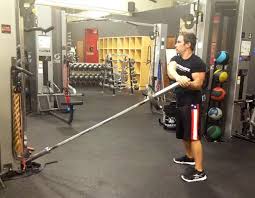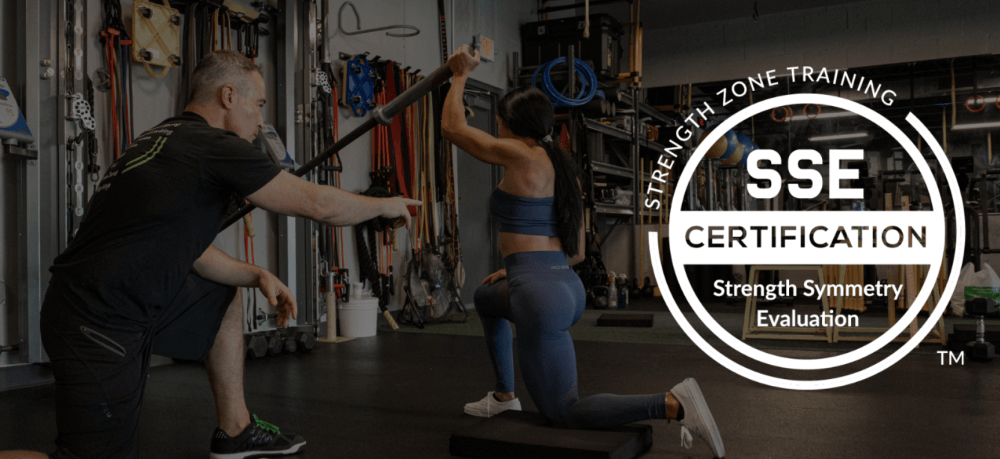Nick Tumminello – Movement Performance Assessment Online Certification

Get Your Clients Training Safely, Quickly, And Effectively With The Only Assessment Designed Specifically For Personal Trainers
Are you a personal trainer that’s learned all the movement assessments out there but feel like none of them work well for your clients?Do you struggle to know exactly which exercises are best for your new clients to get them started safely and without pain?
Have you been looking for the perfect way to create client programs that improve their movement and get results without spending half the workout doing corrective exercises or warm-up drills?
If so, it’s not your fault and help is on the way.
The initial assessment is one of the most important factors when starting a new client or re-starting an old one. It sets the tone for your working relationship, reveals any pain or movement inabilities, and tells you exactly which exercises should make up the client’s first program.
But there’s one big problem, most assessments out there right now don’t do a good job accomplishing all 3 of these outcomes. They fall short on at least one of the three and fail to serve trainers in a way that makes their job easier, not harder.
Some get you hunting for all the things that are “wrong” with a client and encourage you to fix these with rehab exercises before training them hard, but this leaves clients bored and paranoid about being “broken.”
Others might focus on identifying what exercises or movements clients can do but offer no clear direction on exactly which variation is best for their abilities or body type. You’ll have a place to start, but it won’t always be the best one.
While we’ve come a long way in creating assessments to identify how clients move, we’ve yet to design one for trainers that’s simple to perform, quick to understand, and easy to use for designing initial client programs. At least until now.
If you’re tired of piecing together multiple assessments, using too many drills and exercises to fix deficiencies, or not knowing exactly which exercises to use with clients right from the get-go, then the Movement Performance Assessment is designed specifically for you.
The Movement Performance Assessment Includes:

7 Movement Tests That Resemble Actual Exercise

Simple And Fast Testing Procedures

Immediate Feedback On Ideal Exercises For Clients

16 Hours Of Continuing Education Credits
The Movement Performance Assessment Will Teach You How To:

Choose which exercises are right (and wrong) for each person

Determine the best lifting movements to use as a starting point

Find a safer and more individualized training direction

Fix faulty movements with a smarter movement prescription system

Assess on the fly in one-on-one or group settings
12 Practical and Comprehensive Learning Modules
Module #1 – MPA Essentials
1.1 Assessments vs. Screens: Do we have it backwards?
1.2 It’s not about getting more data. It’s about getting more relevant data.
1.3 What should we be looking for, really?
1.4 If you’re assessing these things, you’re still guessing
1.5 How to assess the movements that matter.
1.6 The Hierarchy of exercise
1.7 How trainers lose their way with assessments
1.8 Try this before corrective exercises… because it takes care of most movement deficiencies better and faster.
Module #2 – MPA Rules
2.1 Your clients aren’t broken!
2.2 Fitting exercises to clients, not fitting clients to exercises
2.3 Assessing unloaded and loaded movement
2.4 How to assess your client while giving them a great first session
2.5 What to (not) tell your client about and during the assessment
2.6 Every movement assessment has a reason you and your client understand.
2.7 Awareness vs. Ability
2.8 Pain vs. Performance
2.9 The missing exercises for pain
2.10 M.O.S.T Exercises: Mobility + Strength and Stability
2.10 The Mandatory Movement Assessments
Module #3 – Squat Assessment
3.1 Should we assess the Overhead Squat?
3.2 The fastest way to find their deepest squat
3.3 Why floor hip mobility assessments fail
3.4 Hip over-coverage vs. Under-coverage: The research on hip anatomy, mobility and pain.
3.5 What about butt wink?
3.6 Loaded assessment
3.7 How to quickly find their optimal loaded squat depth
3.8 How (Not) to Go Heavy: Quickly know the best high-load squat variation for them
3.9 Should the squat be a main movement?
3.10 Knee Pain: The instant movement fixes for zero pain.
3.11 Back Pain: The instant movement fixes for zero pain.
3.12 Hip Pain: The instant movement fixes for zero pain.
3.13: Heal Raised Squats: Good or Bad?
3.14 M.O.S.T Exercises for Ankle Mobility
Module #4 – Split-Squat Assessment
4.1 Unloaded assessment
4.2 The fastest fix for knee alignment.
4.3 The missing assessment for optimal tibia position and foot turnout
4.4 What to do if it’s easy for them
4.5 What to do if it’s difficult for them
4.6. Loaded Assessment
4.7 If they have knee pain, this will immediately make them pain-free.
4.8 If they have Hip pain, do this for zero pain.
4.9 The problem with the Bulgarian Split Squat
4.10 A more functional assessment of hip flexor tightness
4.11 M.O.S.T. Exercises for Tight Hip Flexors
Module #5 – RDL Assessment
5.1 Unloaded assessment
5.2 The fastest form fix
5.3 The problem with holding a dowel on their spine
5.4 How to quickly find their optimal depth for spinal health.
5.5 The common hip hinging mistake that can cause back overuse.
5.6 When NOT to do hip hinging, and what to do instead.
5.7 Loaded assessment
5.8 Do this to eliminate back pain from hip hinging fast
5.9 Research shows this part of the hamstrings gets tight, and the simple prevention strategy.
Module #6 – Row Assessment
6.1 Loaded assessment
6.2 The best coaching cue to improve their alignment immediately!
6.3 How the row can help improve the hip hinge.
6.4 What to do if they’re still not able to maintain proper positioning
6.5 How to quickly and easily teach proper scapular movement for the clients who just can’t seem to get it.
6.6 M.O.S.T exercises for rounded shoulders
Module #7 – Plank Assessment
7.1 Straight-arm or bent arm plank?
7.2 Advanced plank assessment
7.3 What does it mean for programming if they can achieve a good plank position?
7.4 What does it mean for programming if they can’t achieve good spinal alignment even with coaching.
7.5 The best (and worst) core exercises for people with a large lordodic curve.
7.6 What the research really says about pelvic tilt, core strength and back pain.
7.7 Should you actively contract your abs while doing a plank?
7.8 How to immediately use this for your “Workout of the day” and in Group Training.
Module #8 – Overhead Press Assessment
8.1 Unloaded Assessment
8.2 Loaded Assessment
8.3 The safest way to press overhead
8.4 Do this to eliminate shoulder pain
8.5 This exercise is more joint friendly than landmine presses
8.6 What the research really says about scapula position, posture and pain.
8.7 M.O.S.T exercises for improving overhead shoulder mobility faster
Module #9 – Dumbbell Bench Press Assessment
9.1 The problem with assessing the Push-up
9.2 Unloaded Assessment
9.3 Loaded Assessment
9.4 What the best depth?
9.5 What does it mean when barbell bench press hurts their shoulders, but dumbbells and push-ups don’t?
9.6 If the barbell, dumbbells and push-ups hurt their shoulders, this will get them pressing without pain immediately.
9.7 Why floor presses suck, and how to make them great.
9.8 Should you avoid pushing exercises if they have rounded shoulders?
Module #10 – Mobility Assessments
10.1 How to easily individualize your mobility warm-ups, even with group training.
10.2 Test, Retests that get instant improvements in range of motion (and wow your clients).
10.3 Thoracic Spine Mobility: Test, Retest
10.4 Shoulder Mobility: Test, Retest
10.5 How hip anatomy should change your hip mobility drills
10.6 These quick, research-based tests will show you who mobility work is a waste of time for.
Module #11 – Rotational Assessments for Athletic Performance
11.1 The problem with anti-rotation training
11.2 The two movement prerequisites for optimal rotational power in sports
11.3 The two mandatory Rotational movement assessments
11.4 The missing exercises for improved rotational power and spine health
11.5 The misunderstood research on lumbar spine rotation, spinal mechanics and back health.
Module #12 – Using the MPA Results In Your Programs
12.1 Using your MPA results is simple, easy and fast.
12.2 How to use your MPA results for in-person and Online Personal Training.
12.3 How to use your MPA for your Workout of the Day and Group Training.
12.4 Joint friendly exercise database for long-term programming.
If you’re tired of struggling to identify the best exercises for your clients right away or finding ways to deliver results without defaulting to corrective exercises, then the Movement Performance Assessment is perfect for you.
Upon completion of this course, you’ll know how to quickly understand each client’s unique needs and be able to create workouts that improve movement while avoiding exercises that they hate or cause pain.
For a fraction of the standard cost of most specialty certifications, you’ll learn how to assess any personal training client in any setting quickly and easily. We know that most trainers will recognize the immense value of this service and enroll right away. It’s not everyday that you get a chance to have one of the best fitness professionals in the world be your coach.






Reviews
There are no reviews yet.